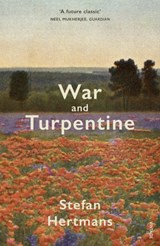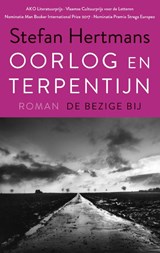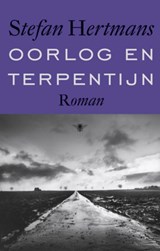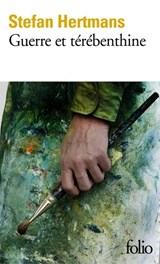David McKay on translating the first sentence of Stefan Hertmans’ Oorlog en Terpentijn (War and Turpentine)
08 september 2016Onlangs verscheen de Engelse vertaling van Stefan Hertmans Oorlog en Terpentijn. Wij vroegen de vertaler, David McKay, zijn werk toe te lichten.
N.B. Ook Hertmans' vertalers uit het Duits en Frans schreven al over het vertalen van Oorlog en Terpentijn. Lees de bijdragen van Ira Wilhelm en Isabelle Rosselin. En Jerker Spits besprak de roman voor ons.
De verste herinnering die ik aan mijn grootvader heb, is die aan het strand van Oostende - een man van zesenzestig, keurig in het nachtblauwe pak, heeft met de blauwe strandschep van zijn kleinzoon een ondiepe put gegraven waarvan hij de opgeworpen rand heeft afgeplat, zodat hij en zijn vrouw daar enigszins gerieflijk kunnen gaan zitten.
In my most distant memory of my grandfather, he is on the beach at Ostend: a man of sixty-six in a neat midnight-blue suit, he has dug a shallow pit with his grandson's blue shovel and levelled off the heaped sand around it so that he and his wife can sit in relative comfort.
Translation is sometimes a matter of replicating exactly what the author is doing with words: de verste herinnering is not just a normal Dutch way of saying 'the earliest memory', nor is it a poet's idiosyncratic phrase ('the furthest memory'). Rather, verre herinnering is the usual way of saying 'distant memory', with all the connotations of that phrase - a fleeting recollection of a far-off scene. De verste herinnering is this phrase in the superlative: 'the most distant memory' - the elusive image of a time that could hardly be more remote and yet is tied to the author by a thin strand of memory. With these first three Dutch words, Hertmans begins to evoke the central theme of his novel: our tenuous yet real connection to our family history, and therefore to the great events of human history.
Changing the structure
Translation is sometimes a matter of seeing what has to be changed. A slightly more literal English translation might start this way:
My most distant memory of my grandfather is the one on the beach at Ostend: a man of sixty-six in a neat midnight-blue suit has dug a shallow pit with his grandson's blue shovel...
Hertmans deftly separates his introductory clause, a complete sentence in itself, from the image it introduces, which forms another complete sentence. This strengthens the sense of a man gazing at a picture, another central motif of the novel. Just one problem: it doesn't quite work in English. 'The one on the beach at Ostend' or 'that on the beach at Ostend' sounds peculiar. More importantly, making 'a man of sixty-six' the subject of a new clause is confusing: is this man the same person as the narrator's grandfather, or some new character?
I can't prove that the potential confusion is greater in English than in the original Dutch; when I tackled this first sentence of War and Turpentine, I had to rely on my intuition that a different approach was needed. My solution involved changing the structure of the sentence and introducing the pronoun 'he', which refers directly back to 'my grandfather'. Translation is a swift succession of micro-miracles like this one, scores upon scores of decisions that the translator cannot fully justify or explain.
Revise, revise, revise
Google Translate, despite all its flaws and its moments of unintended hilarity, is a wonder of technology. But it seems to lack any counterpart of the gut feelings that are constantly prodding the translator to do a bit better. Take the end of this sentence, which Google Translate renders as 'so he and his wife there to sit down somewhat comfortable'. My whole body responds to this version: my belly churns, my shoulders hunch, my hands itch to revise it. Then my ear, just as instinctively, provides an alternative: 'so that he and his wife can sit slightly comfortably'. This new wording is a vast improvement and provides some physical relief at first. But my stomach gives another twinge: I'm not quite there yet. 'Sit in relative comfort?', my ear suggests. Yes, that'll do, for the time being, my body tells me.
Where did my new version come from? For example, what happened to the word 'there', the translation of daar? I once studied linguistics, and with help from the Internet and my reference books, I could probably come up with some compelling explanation. But even without doing that, I can sense that my solution is good enough. Yes, I could easily be wrong, but tiny leaps of faith are what keep me moving forward - otherwise, I would be as stuck as Google Translate, unable to revise my work effectively or decide when to stop revising.
Inner voice
Don't get me wrong: there's no guardian angel on my shoulder, or if there is, it's far from infallible. After grappling with this sentence for the first time, I took the whole book through many drafts, questioning my decisions, looking things up, talking to friends and fellow translators, turning to experts for advice, and benefiting greatly from the input of the author, my editors, and other readers. And every time, I found ample room for improvement. But that mysterious inner voice was always central to the process: 'Wait. Try again. That's better, but... Try this. Yes. That's OK for now. Move on.'
David McKay studeerde filosofie en linguïstiek en werkt sinds 1998 als freelance vertaler van voornamelijk literair proza en non-fictie. Vorig jaar verscheen zijn Engelse vertaling Everything to nothing van Geert Buelens' Europa Europa! Kijk voor meer informatie op zijn website.







